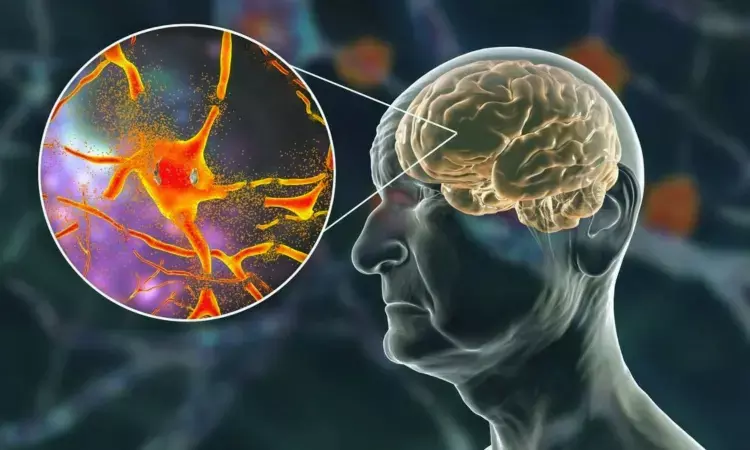- Home
- Medical news & Guidelines
- Anesthesiology
- Cardiology and CTVS
- Critical Care
- Dentistry
- Dermatology
- Diabetes and Endocrinology
- ENT
- Gastroenterology
- Medicine
- Nephrology
- Neurology
- Obstretics-Gynaecology
- Oncology
- Ophthalmology
- Orthopaedics
- Pediatrics-Neonatology
- Psychiatry
- Pulmonology
- Radiology
- Surgery
- Urology
- Laboratory Medicine
- Diet
- Nursing
- Paramedical
- Physiotherapy
- Health news
- Fact Check
- Bone Health Fact Check
- Brain Health Fact Check
- Cancer Related Fact Check
- Child Care Fact Check
- Dental and oral health fact check
- Diabetes and metabolic health fact check
- Diet and Nutrition Fact Check
- Eye and ENT Care Fact Check
- Fitness fact check
- Gut health fact check
- Heart health fact check
- Kidney health fact check
- Medical education fact check
- Men's health fact check
- Respiratory fact check
- Skin and hair care fact check
- Vaccine and Immunization fact check
- Women's health fact check
- AYUSH
- State News
- Andaman and Nicobar Islands
- Andhra Pradesh
- Arunachal Pradesh
- Assam
- Bihar
- Chandigarh
- Chattisgarh
- Dadra and Nagar Haveli
- Daman and Diu
- Delhi
- Goa
- Gujarat
- Haryana
- Himachal Pradesh
- Jammu & Kashmir
- Jharkhand
- Karnataka
- Kerala
- Ladakh
- Lakshadweep
- Madhya Pradesh
- Maharashtra
- Manipur
- Meghalaya
- Mizoram
- Nagaland
- Odisha
- Puducherry
- Punjab
- Rajasthan
- Sikkim
- Tamil Nadu
- Telangana
- Tripura
- Uttar Pradesh
- Uttrakhand
- West Bengal
- Medical Education
- Industry
Chronic musculoskeletal pain may contribute to higher risk of cognitive decline, study finds

China: Researchers in the US and China have discovered that chronic musculoskeletal pain (CMP) could be linked to a higher risk of dementia and brain aging.
In the study published in Nature Mental Health, people with knee osteoarthritis (OA) had more rapid brain aging than those without it. Furthermore, a genetic link between inflammation and brain function may indicate a way to predict cognitive decline, but according to the experts, there is a need for further study.
The researchers examined the magnetic resonance imaging (MRI) data from more than 9,000 people in the United Kingdom and found a connection between knee osteoarthritis and accelerated brain aging.
Chronic musculoskeletal pain is a prevalent and heterogeneous condition characterized by persistent pain in various parts of the body. It is a leading cause of disability worldwide and greatly impacts a patient's brain. Apart from pain, older adults with CMP also experience accelerated cognitive decline and higher dementia risk with a limited understanding of the biological mechanism underlying the associations between CMP and dementia risk.
The researchers note that a multiscale study to disentangle pathological brain aging from normal brain aging may reveal the underlying mechanisms.
Against the above background, Yiheng Tu, Chinese Academy of Sciences, Beijing, China, and colleagues conducted a multiscale study to disentangle pathological brain aging from normal brain aging may reveal the underlying mechanisms. They developed an MRI-based brain age model (N = 6,725) using large-scale, cross-sectional, and longitudinal cohorts (N = 9,344) to evaluate the difference between brain age and chronological age, termed ‘predicted age difference’ (PAD), across several common types of CMP (N = 2,427).
The key findings of the study are as follows:
- The study unveiled significantly increased PAD in knee osteoarthritis cohorts versus healthy controls and validates it in an independent dataset (N = 192), suggesting a pattern of brain-aging acceleration in knee OA. This acceleration was contributed by the hippocampus in both datasets and predicted memory decline and dementia incidents during follow-up.
- The SLC39A8 gene showed pleiotropy between brain-aging accelerations and knee OA and exhibited spatially transcriptional associations with the regional contributions to brain-aging accelerations.
- The genes exhibiting spatially strong transcriptional associations with regional contributions were highly expressed in microglial cells and astrocytes and were mainly enriched in synaptic structure and neurodevelopment.
"These findings highlight a heterogeneous pattern of brain aging in chronic musculoskeletal pain and reveal a heritable morphological pattern that links brain-aging acceleration to cognitive decline and an elevated risk of dementia in knee OA," the researchers concluded.
Reference:
Zhao, L., Liu, J., Zhao, W., Chen, J., Fan, J., Ge, T., & Tu, Y. (2024). Morphological and genetic decoding shows heterogeneous patterns of brain aging in chronic musculoskeletal pain. Nature Mental Health, 1-15. https://doi.org/10.1038/s44220-024-00223-3
Dr Kamal Kant Kohli-MBBS, DTCD- a chest specialist with more than 30 years of practice and a flair for writing clinical articles, Dr Kamal Kant Kohli joined Medical Dialogues as a Chief Editor of Medical News. Besides writing articles, as an editor, he proofreads and verifies all the medical content published on Medical Dialogues including those coming from journals, studies,medical conferences,guidelines etc. Email: drkohli@medicaldialogues.in. Contact no. 011-43720751


